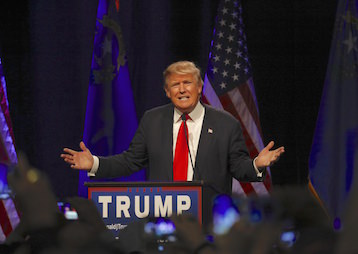Donald Trump Changes His Tune on Key Campaign-Trail Pledges
Remember how, mere weeks ago, Trump's supporters chanted "Lock her up!" with gusto?
Remember how, mere weeks ago, Donald Trump’s supporters chanted “Lock her up!” with gusto?
Fast-forward to Tuesday, when Trump’s camp issued a surprising response to that battle cry, which was based on his campaign-trail vow to jail rival “Crooked” Hillary Clinton once Trump was elected. That punishment would be for the Clinton Foundation’s alleged financial misconduct or for Clinton’s use of a private email server to conduct official business during her tenure as secretary of state.
The New York Times relayed the latest on Trump’s revised take on Clinton:
In an appearance on MSNBC’s “Morning Joe” program, Kellyanne Conway, the former Trump campaign manager and a senior adviser to his transition, said the president-elect wanted to “move beyond the issues of the campaign” and confirmed that Mr. Trump did not want his promised Clinton investigations to take place.
“If Donald Trump can help her heal, then perhaps that’s a good thing,” Ms. Conway said.
And there was more: “I don’t want to hurt the Clintons, I really don’t,” he said during a meeting with the paper’s staff members Tuesday morning.
Trump’s apparent about-face caused consternation among some of his supporters, including conservative media commentator Ann Coulter, who tweeted her displeasure after the news broke:
Whoa! I thought we elected @realDonaldTrump president. Did we make him the FBI, & DOJ? His job is to pick those guys, not do their jobs. https://t.co/8JCQOO0dSF
— Ann Coulter (@AnnCoulter) November 22, 2016
Missing from Coulter’s comment is the acknowledgment that Trump’s prior claim that he could see to it that Clinton was put behind bars constituted a troubling overstatement of presidential power in the first place.
Again from the NYT:
But it could deeply disappoint many of the voters whose anger against Mrs. Clinton he helped stoke throughout a bitter and divisive campaign. During the second debate between the two candidates, Mr. Trump turned to Mrs. Clinton and vowed that “if I win I am going to instruct my attorney general to get a special prosecutor to look into your situation, because there’s never been so many lies, so much deception.”
A White House directive to close an F.B.I. criminal investigation would be highly unusual. The bureau and the Justice Department are supposed to conduct investigations free from political influence. There are instances when the White House does have a say in investigations, but they involve national security matters such as the arrest and capture of terrorism suspects overseas or the indictment of Chinese hackers. Those are decisions that could have global ramifications.
“It does seem like an extraordinary breach of protocol for him to get involved in that decision,” said Glen A. Kopp, a former federal prosecutor in New York. “I know of no recent circumstances when the president ordered an attorney general not to pursue a criminal matter.”
The new president’s decision is likely to frustrate investigators at the F.B.I., who are fiercely protective of their independence to follow the facts that they uncover. A declaration from Mr. Trump that he wanted inquiries about Mrs. Clinton to stop could be seen as unwarranted presidential meddling into an investigation.
Trump’s Clinton shift wasn’t a one-off, either. The editorial group from The New York Times that sat down on Tuesday with the president-elect followed up with more surprises from their meeting:
The president-elect’s turnabout on the need for torture as a tool in the fight against terrorism, which he repeatedly endorsed during the campaign, was remarkable. Mr. Trump suggested he has changed his mind about the usefulness of waterboarding and other forms of torture after talking with James N. Mattis, a retired Marine Corps general, who headed the United States Central Command.
[…] On climate change, he refused to repeat his promise to abandon the international climate accord reached last year in Paris, saying that, “I’m looking at it very closely.” But he said “I have an open mind to it” and that clean air and “crystal clear water” were vitally important.
He held out assurances that he did not intend to embrace extremist positions in some areas. He vigorously denounced a white nationalist conference in Washington over the weekend where attendees gave the Nazi salute and criticized Jews.
Asked about his antagonism with the news media and his vow to rethink libel laws, he told the group, which included The Times’s publisher, Arthur O. Sulzberger Jr., and other executives: “I think you’ll be happy.”
But pressed to respond to criticism in other areas, he was defiant. He declared that “the law’s totally on my side” when it comes to questions about conflict of interest and ethics laws. “The president can’t have a conflict of interest.”
He said it would be extremely difficult to sell off his businesses because they are real estate holdings. He said that he would “like to do something” to address ethics concerns, and he noted that he had turned over the management of the businesses to his children.”
Trump also raised eyebrows at the meeting by suggesting that his son-in-law, Jared Kushner, was a strong candidate to become special envoy tasked with bringing peace to the Middle East. Kushner, Trump said, “could be very helpful” in brokering a peace deal between the Israelis and the Palestinians.
Tuesday’s other revelations included the news that the future president disavowed the alt-right and that his charitable foundation had admitted to engaging in self-dealing practices.
–Posted by Kasia Anderson
Independent journalism is under threat and overshadowed by heavily funded mainstream media.
You can help level the playing field. Become a member.
Your tax-deductible contribution keeps us digging beneath the headlines to give you thought-provoking, investigative reporting and analysis that unearths what's really happening- without compromise.
Give today to support our courageous, independent journalists.






You need to be a supporter to comment.
There are currently no responses to this article.
Be the first to respond.